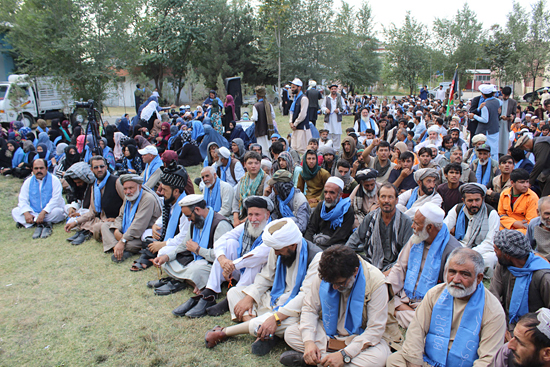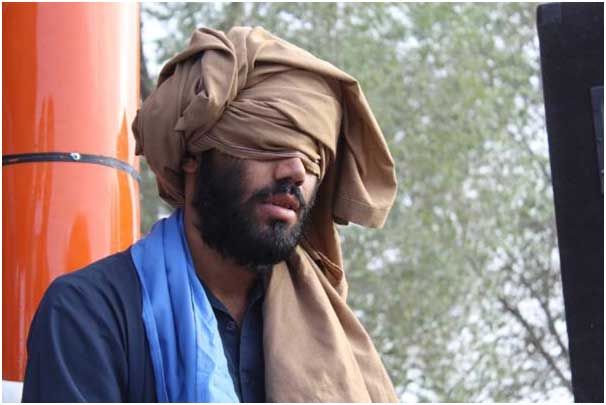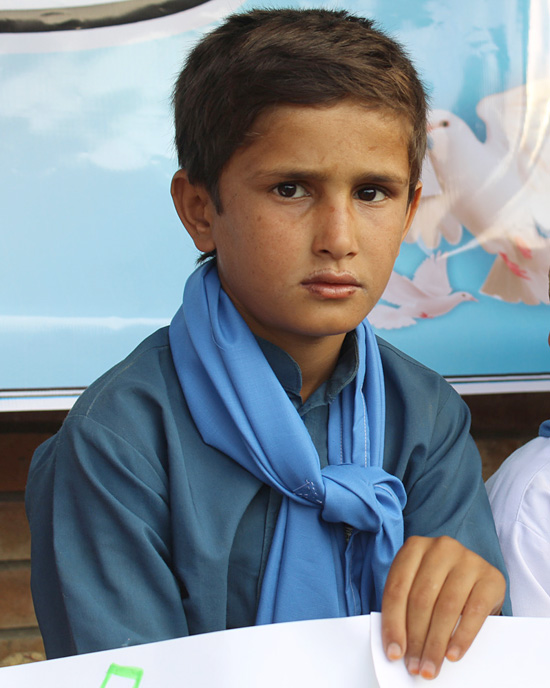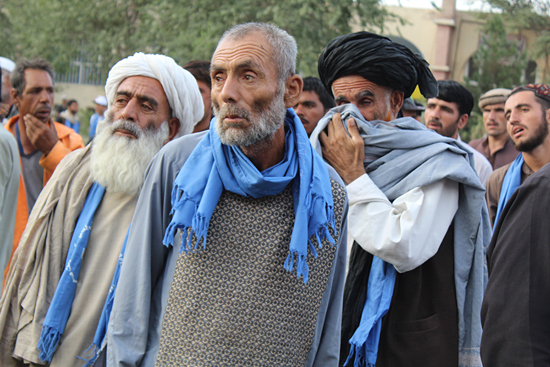Dr. Hakim / AntiWar.com & Brian Cloughley / AntiWar.com – 2018-08-21 23:22:32
https://original.antiwar.com/Dr_Hakim/2018/08/20/in-afghanistan-our-need-to-rethink-the-institution-of-war/
In Afghanistan, Our Need To
Rethink the Institution of War
Dr. Hakim / AntiWar.com
(August 21, 2018) — It’s frustrating that whereas all human beings wish to live meaningful lives, we seem helpless in the face of a few individuals waging wars and exploiting our world.
But we can each do something about this insensible status quo, as ordinary folk of the People’s Peace Movement (PPM) show us by taking one barefoot-step at a time, traveling to the Northern areas of Afghanistan to persuade fellow Afghans, whether they’re with “insurgent groups” or with the US/NATO/Afghan forces, to stop fighting.
The People’s Peace Movement (PPM) walking barefoot to the Northern provinces of Afghanistan, led by Zindani, a blind member of their group. Photo from PPM’s Facebook Page.
Their action of walking without shoes suggest to us that, for us to survive today’s militarized and profit-driven norms, we have to live each day differently, and with clarity and compassion.
We’ve been thinking that we need armies to stop “terrorists,” but armies don’t stop “terrorists.” Instead, they give “terrorists” reason to keep fighting.
We need to think anew.
Moreover, the roots of “terrorism” lie within ourselves. We are our own source of wars.
Iqbal Khyber, a representative of PPM, told the Afghan Peace Volunteers (APVs) about how violence has taken root in all of us. “A blind member of our group, Zindani (a name he gave himself after he was blinded by a Taliban-planted roadside bomb, meaning ‘imprisoned’) had so much pain in him that, one evening, when we were camped outside the US Embassy in Kabul, he pleaded with me, ‘Can I throw a pebble at the fence?'”
“I advised Zindani, ‘No, we need to end the anger inside us.'” Iqbal continued.
Zindani is rightfully angry because he has been hurt by all sides of the Afghan conflict, like all civilians in all wars. His father literally disappeared from his life when he was just seven, as a bomb from a US airstrike in Helmand left “a crater so large that no trace of his father and uncle could be found.”
Years later, another bomb — this time a Taliban device — killed his sister and blinded him. He not only lost his sight, he also lost the chance to marry the teenage love of his life.
At a large gathering in Kabul, Zindani sat in front of a crowd of Afghans who were shouting, “We want peace! Enough war!” He had a brown turban wrapped over his head and eyes, and a Borderfree blue scarf of the Afghan Peace Volunteers draped around his neck.

The crowd at the PPM’s meeting in Kabul on the 9th of August 2018.
Photo by Dr. Hakim

Zindani is determined to end war.
Photo by Dr. Hakim
He was quiet.
But his stand was clear. He had already walked more than 700 km from Helmand to Kabul, and he was ready to persist.
He couldn’t see the crowd before him, but he could hear them, and understand their intense desire to end the war.
What makes us think that ordinary people like Zindani, or we ourselves, cannot end “terrorism” and wars through nonviolent methods? Misinformation has infected us with doubts.
One way to work through those doubts is to emulate Zindani, members of the PPM and the APVs: relate person-to-person, ask, “How can we live better?”, listen, love.
And to take courage in not doubting love when we encounter it.
“I was suspicious of their intentions. Politicians and leaders have misused the people so much we can no longer trust one another. But, when I met and conversed with these people from Helmand, I knew we could work together,” Masuma testified to the other Volunteers who had gathered on another occasion to hear from four members of the Movement.
How about fear? How do we deal with legitimate fears?
The Volunteers were grappling with multiple concerns before they went to the big meeting organized by the PPM, held just next to Ghazi Stadium, where the Taliban used to execute people publicly.
Surely, Zindani, with his past trauma of losing eight family members to war, has been afraid all through his dark journey. Fear is an emotion we can work with, like our experience of fear even in love, like Zindani did in creating two poetic lines for his teenage girlfriend:
I am too scared to even drink water
It may fade my beloved’s name on my heart.
Love triumphs over fear.
“We’ll go together, come what may,” Khalid, an Afghan Peace Volunteer who is a university undergraduate, had said. At the large gathering, Khalid was so ‘fired up’ that he overcame his usual shyness for 30 seconds on stage, delivering two lines of a Pashto poem, which meant:
“Whatever you destroy,
don’t destroy my thoughts and my mind.”

The young want an end to war.
Photo by Dr. Hakim

The old want an end to war.
Photo by Dr. Hakim
The APVs, the PPM and the people want an end to war.
Photo by Dr. Hakim
That’s how we can overcome fear, and end the obsolete human institution of war.
We can love.
We can think anew.
We can turn up together.
Dr. Hakim, (Dr. Teck Young, Wee) is a medical doctor from Singapore who has done humanitarian and social enterprise work in Afghanistan for more than 10 years, including being a mentor to the Afghan Peace Volunteers, an inter-ethnic group of young Afghans dedicated to building nonviolent alternatives to war. He is the 2012 recipient of the International Pfeffer Peace Prize and the 2017 recipient of the Singapore Medical Association Merit Award for contributions in social service to communities.
Get Out of That Quagmire in Afghanistan
Brian Cloughley / AntiWar.com
(August 21, 2018) — A lot happened in and about Afghanistan on August 15. The BBC reported that 48 people were killed in Kabul and that there has been “a recent upsurge in militant violence, including a major Taliban assault on the eastern city of Ghazni [where] at least 100 members of the security forces were killed.”
Then Stars and Stripes told us that “Sergeant Reymund R. Transfiguracion, the Special Forces soldier who died Sunday [August 12] in Afghanistan from wounds in a bomb blast was a husband and father of two.”
These and other items of news raised once more the vexed question — how long is this disaster going to continue?
In April 1971, John Kerry, who served in Vietnam and was later Secretary of State, appeared in front of a US Senate Committee and asked: “How do you ask a man to be the last man to die in Vietnam? How do you ask a man to be the last man to die for a mistake?”
Today, we could do with a John Kerry to ask the same question about the war in Afghanistan.
On August 5 it was reported that “a suicide bomber has killed three Czech NATO soldiers in an attack in eastern Afghanistan. The victims were targeted while on a routine foot patrol alongside Afghan forces, NATO officials said in a statement. A US soldier and two Afghan soldiers were wounded in the attack in Charikar, the capital of Parwan province.”
Just what is being achieved by Czech soldiers on combat patrols 5,000 kilometers from home is not explained by any of the authorities responsible for their deployment — and thus for placing them in jeopardy of their lives — but the usual nauseating platitudes were promptly mouthed by some of them.
The Czech prime minister, Andrej Babis, declared that the dead soldiers were “heroes who fought against terrorism so far from home.” Well, he should know about operating far from home. Forbes lists him as being worth four billion dollars and owning “a Michelin-starred restaurant, La Paloma, in the French Riviera” which is no doubt some consolation to the relatives and friends of the men who were killed.
Babis sent his “deepest condolences to their families” as did the ever-ready General John Nicholson, the sixteenth commander in Washington’s seventeen years of war, who, never at a loss for futile banality, babbled that “Their sacrifice will endure in both our hearts and history and further strengthen our resolve.” What utter garbage.
The “sacrifice” of these Czech soldiers won’t be felt by any hearts other than those of their grieving families, and it is insulting to cliché-claim that it will. And their deaths won’t get even the tiniest footnote in history. As to “strengthening our resolve” — resolve to do what? — to carry on mouthing phony inanities about the utter chaos in Afghanistan?
This tawdry display of fake emotion sticks in the gullet — but it’s not as sickening as the observation in The Economist that the war’s “current cost — roughly $45 billion and around a dozen lives a year — is modest enough to invite little interest from Congress or the media. That suggests Mr. Trump’s strategy is sustainable.”
The talented intellectuals of The Economist think that the deaths of a dozen American soldiers every year in the unwinnable Afghan War indicate that the policies of Trump and the Pentagon can be maintained indefinitely. What’s a dozen lives a year, after all?
Well, listen to me, you clever little intellectuals and you blundering military strategists, because I’m going to tell you a few home truths.
The soldiers who have died — and those who are going to die — have relatives who love them. They have parents, brothers, sisters, wives, partners, children, all of whom suffer when the lives of their nearest and dearest are sacrificed by a bunch of no-hopers as part of a “modest” cost in a supposedly “sustainable strategy” in a country that is ungovernable.
The Costs of War Project at Brown University estimates that over 100,000 people have died in the war in Afghanistan. They weren’t all soldiers, of course, because in conflicts like this, the civilian population always suffers from action by both militants and the armed forces involved. In July, the UN reported that 1,692 Afghan civilians were killed, and 3,430 injured in the first six months of 2018, which is the record for that period in the seventeen years of this catastrophe.
But let’s get back to the soldiers who are dying.
On August 9 it was finally acknowledged by the Kabul government that over twenty Afghan soldiers had been killed in an insurgent attack on August 3 in Uruzgan province. (We’ll never know the real number.)
Consider what happens to the dependent families of dead Afghan soldiers: the widows are entitled to pensions, of course — but Afghanistan is the third most corrupt country in the world. Do you imagine for a moment that these grief-stricken women receive a fraction of the tiny amount to which they are entitled? Of course they don’t. Usually they don’t get a bean, because the money is stolen by crooked and heartless government officials. What have you to say to that, General Nicholson? Does it strengthen your resolve to do anything?
As reported by the Japan Times, “Help for Afghan Heroes, an Afghan nonprofit organization supporting 5,000 families of wounded or dead security forces, said corruption is a key reason many women do not receive assistance.” Nasreen Sharar, special projects officer for the group, said that “they are asked to pay a bribe to get the application processed and they often don’t have the money.”
Of course they don’t have the money. They are just tiny inconsequential and stricken blobs in a “sustainable strategy” that costs the $45 billion and “around a dozen lives” a year.
Don’t you just love that word “around”? It’s the sort of word used during the Vietnam war by smart-assed intellectuals like Robert McNamara, who eventually admitted that “We were wrong, terribly wrong. We owe it to future generations to explain why.”
Well, he may have explained his hideous disaster, but obviously nobody was listening, least of all Nicholson, whose pronouncements on July 23 included the gibberish that “The advancement toward the reconciliation goal in President Trump’s strategy has seen progress in the last year that we haven’t seen in the previous 17 years, and that is significant.” Does he ever listen to himself?
And what about the Czech army soldiers who were killed in Afghanistan? The Western media carried the 130-word Reuter’s report about their deaths, and then forgot all about them, which makes a sick joke of Nicholson’s pompous pronouncement that “Their sacrifice will endure in both our hearts and history.”
They were Staff Sergeant Martin Marcin, 36, and Corporals Kamil Benes, 28, and Patrik Stepanek, 25, about whose deaths the Czech Defense Minister Lubomir Metnar declared that “We have witnessed a tragedy that can hardly be prevented when you serve in the army.”
I would really like to be able to put that grubby politician on a patrol in Afghanistan, along with the intellectuals of The Economist and all the other smart-assed commentators to whom soldiers’ lives and grieving, defrauded, poverty-stricken widows mean nothing.
In all the years of useless conflict in Afghanistan the western media has never listed the names of Afghan Army soldiers killed in action, because these soldiers don’t matter in the greater scheme of things — the “sustainable strategy” — in which they are but trivial pawns, as are all the civilians who are killed by bombing, whether on the ground by the Taliban, or from the sky by Afghan-US-NATO airstrikes.
The BBC reports that: “Since President Trump announced his Afghanistan strategy . . . the number of bombs dropped by the US Air Force has surged dramatically. New rules of engagement have made it easier for US forces to carry out strikes against the Taliban” and this surge in aerial blitzing has certainly had an effect.
In the first six months of 2018 the UN documented “353 civilian casualties (149 deaths and 204 injured) from aerial attacks, a 52 percent increase from the same period in 2017. The mission attributed 52 percent of all civilian casualties from aerial attacks to the Afghan Air Force, 45 percent to international military forces, and the remaining three per cent to unidentified Pro-Government Forces.”
While Afghan and foreign air forces blitz the country, and the Taliban and other militants wreak havoc with their constant attacks, all that happens politically is that corruption thrives and the murderously criminal vice-president, Abdurrashid Dostum, returns from self-imposed exile to contribute to further chaos. The place is ungovernable, and the foreigners should get out of that quagmire – now.
As John Kerry said, almost fifty years ago: “How do you ask a man to be the last man to die for a mistake?
Brian Cloughley is author of A History of the Pakistan Army.
Posted in accordance with Title 17, Section 107, for noncommercial, educational purposes.